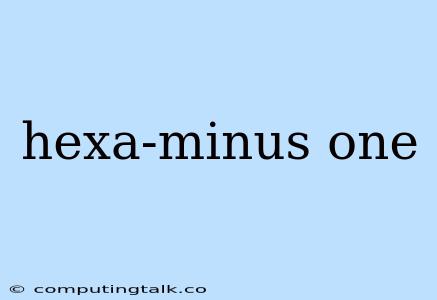The term "hexa-minus one" is not a commonly recognized term in any specific field. It's likely a made-up term or a specific jargon used within a particular niche or community.
To understand what "hexa-minus one" might mean, we need more context. Here are some possible interpretations based on the potential use of the term:
1. Mathematical Interpretation:
- Hexadecimal System: If we consider "hexa" as a reference to the hexadecimal number system (base 16), then "hexa-minus one" could imply a value one less than a hexadecimal number.
- Example: If "hexa" represents the hexadecimal value "F" (which equals 15 in decimal), then "hexa-minus one" would be "E" (which equals 14 in decimal).
2. Computer Science/Programming:
- Hexadecimal Color Codes: "Hexa" could refer to the hexadecimal color codes used in web design and programming (e.g., #FF0000 for red). "Minus one" might indicate a slight adjustment or modification to the color code.
- Example: If a color code is #FF0000, "hexa-minus one" could mean decreasing the red component by one unit, resulting in #FE0000.
3. Technical Jargon:
- Specific Field: "Hexa-minus one" could be a unique term within a specialized field like engineering, chemistry, or a specific type of software development.
- Example: In a field like electrical engineering, it might refer to a specific type of electrical component or a particular step in a process.
4. Misspelling or a Playful Term:
- Typo: It is also possible that "hexa-minus one" is a misspelling or a deliberate playful term.
To get a clear understanding of the meaning, please provide additional context, such as:
- The source of the term: Where did you encounter "hexa-minus one"?
- The surrounding text or conversation: What was being discussed before or after this term?
- The intended field: What field or subject is relevant to the discussion?
With more information, we can better decipher the meaning and purpose of "hexa-minus one."
